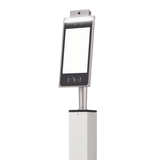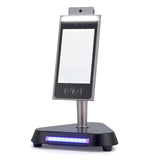The Y-Q5 Contactless Temperature Scanning Kiosk combines a high-precision infrared temperature sensor with features such as facial recognition, intelligent access and attendance control to give users a wide variety of useful functions
Contactless and rapid body temperature detection for registration and recording purposes can be utilized across domains as diverse as office buildings, hotels, entry gates, schools, shopping malls, and community centers, and can offer assistance in public service, management, and traffic control projects.
Product Highlights
- Provides contactless automatic temperature detection, using a face brush for high-precision infrared body temperature collection that is fast and efficient
- Has a temperature measurement range of 82.4-113 °F, with accuracy 0.9 °F
- Optional identification for people without masks, with real-time warnings
- Supports binocular in-vivo detection
- Supports Ethernet, Wi-Fi, and Bluetooth connection
- Uses a mature facial recognition algorithm to accurately recognize faces, with a face recognition time <0.5 sec
- Utilizes rich interface protocols, with support for SDK and HTTP protocols under
- Windows/Linux and other platforms
- Features an 8-inch IPS HD display
- Supports 30,000 facial comparison libraries
- Supports LAN networking and can manage multiple tablets at the same time
- Supports network upgrades, USB upgrades, and computer system upgrades
Center for Disease Control & Prevention Recommendations
Fever
- CDC considers a person to have a fever when he or she has a measured temperature of 100.4° F (38° C) or greater, or feels warm to the touch, or gives a history of feeling feverish.Note: Even though measured temperature is the preferred and most accurate method to determine fever, it is not always possible to take a person’s temperature. In certain situations, other methods of detecting a possible fever should be considered:
- self-reported history of feeling feverish when a thermometer is not available or the ill person has taken medication that would lower the measured temperature.
- the person feels warm to the touch
- appearance of a flushed face, glassy eyes, or chills if it is not feasible to touch the person or if the person does not report feeling feverish.
The presence of fever suggests an infectious cause, but fever is not always present with an infection.
Prevent and Reduce Transmission Among Employees
Monitor federal, state, and local public health communications about COVID-19 regulations, guidance, and recommendations and ensure that workers have access to that information. Frequently check the CDC COVID-19 website.
Actively encourage sick employees to stay home
- Employees who have symptoms should notify their supervisor and stay home. CDC recommends testing for people with any signs or symptoms of COVID-19 and for all close contacts of persons with COVID-19.
Consider conducting daily in-person or virtual health checks (e.g., symptom and temperature screening) of employees before they enter the facility, in accordance with state and local public health authorities and, if available, your occupational health services. Screening and health checks are not a replacement for other protective measures such as social distancing, mask wearing (unless respirators or face masks are required), and engineering controls, including proper ventilation. Symptom and temperature screening cannot identify people with SARS-CoV-2 infection who are asymptomatic (do not have symptoms) or are presymptomatic (have not developed signs or symptoms yet but will later).
For in-person health checks, conduct them safely and respectfully and in a way that maintains social distancing of workers in and entering the screening area. Workers should not enter the worksite past the screening area if any of the following are present:
- Symptoms of COVID-19
- Fever of 100.4 degrees Fahrenheit (oF) or higher or report feeling feverish
- Undergoing evaluation for SARS-CoV-2 infection (such as pending viral test)
- Diagnosis of SARS-CoV-2 infection in the prior 10 days
- Close contact to someone with SARS-CoV-2 infection during the prior 14 days




